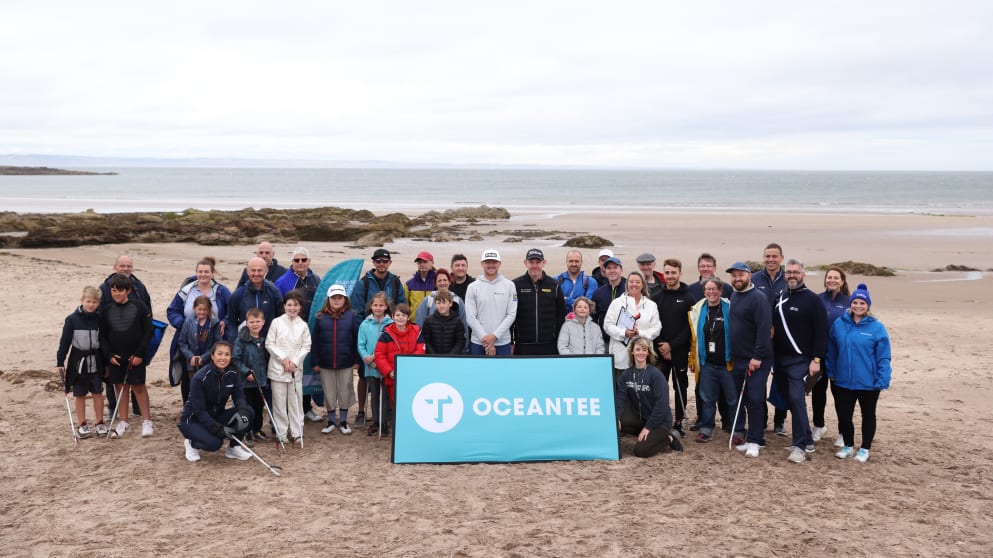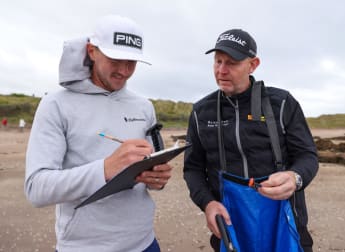A beach clean, an education session for local children and a host of initiatives around The Renaissance Club saw the DP World Tour's Green Drive hit new heights at the 2022 Genesis Scottish Open.

Here is a look at how the third Rolex Series event of the season had sustainability at its very core.
Beach clean with OCEANTEE
On Wednesday, Stephen Gallacher, Mackenzie Hughes and children from the Stephen Gallacher Foundation took part in a beach clean as part of the OCEANTEE Sustainability Series.
The stunning 13th is the signature hole at The Renaissance Club and Gallacher and company headed down to the adjacent beach to help the Marine Conservation Society conduct an analysis of the shoreline waste.
The data collated from the beach clean will be added to a national database that helps the charity understand ocean pollution.
The beach by the 13th is a beautiful place but home favourite Gallacher was surprised to find how much mess there was when you get up close.
"It looked a perfectly normal clean beach but when you get down to it and you see all the plastic and towels and bags and stuff, it's great to get it picked up and make it as clean as we can," he said.
"I've seen sustainability become more prominent at the Scottish Open. Now we’re seeing electric cars coming in, as Genesis are bringing in electric cars as courtesy cars.
"I think you've just got to do it slowly and chip away and get the word out there that we're doing our best and we're going to keep doing that for the future."
The beach clean was the first of five sustainability activations that OCEANTEE will deliver at DP World Tour tournaments in the coming year to educate fans on important sustainability topics.
Educating children on sustainability
Before heading down to the beach, The Marine Conservation Society carried out an education session for the children.
To view the details outlined in the session, please click here.
Teaming up with the Gold Standard
The Genesis Scottish Open was taking responsibility for unavoidable carbon emissions using accredited climate projects as part of a new strategic collaboration between the DP World Tour and the Gold Standard.
Two climate protection projects creating sustainable development benefits for their communities were selected via the Gold Standard.
The projects in Timor-Leste and Laos in Southeast Asia make certified contributions to carbon reduction, as well as global climate justice by delivering impact to the United Nations Sustainable Development Goals (SDGs). Core emissions for the Genesis Scottish Open will be offset, including all energy, waste, haulage, player, event-organiser and guest travel.
The WithOneSeed community forestry programme is working with subsistence farmers in the remote state Timor-Leste to replant their forests, improve livelihoods and build their economies to help the climate.
In Laos, the project with social enterprise TerraClear is delivering enhanced clean water access for rural communities, thereby improving health, contributing to the household economy and helping to conserve local forests.

On-site actions
The practical measures to reduce the Genesis Scottish Open resource use, emissions and waste were planned, tracked and promoted in collaboration with GEO Foundation for Sustainable Golf, and included:
• Promotion of public transport and the provision of complimentary shuttle buses from Longniddry Station to the venue – with an estimated 1,000 fans per day or 10% of fans anticipated to travel by this means, saving an estimated 5.2 tonnes of CO2e travelling by train and shuttle compared to a single car model travelling from Edinburgh
• Provision of eight player and spectator hydration stations, supplied by mains water, and encouraging use of re-useable water bottles. Reduction in use of plastic water bottles estimated to be 40,000, with estimated carbon reduction of 4.1 tonnes CO2e compared to plastic bottled water provided entirely by a regional provider
• All on-course catering outlets use only wooden cutlery, paper straws, 100% biodegradable food trays and 100% compostable hot drink cups. Removing similar items from other waste streams, supporting zero waste to landfill targets and aligning with new Scottish Government Regulations on single use materials at events. Recycling points were provided across the site
• All generators were powered by hydrogenated vegetable oil (HVO) bio-fuel with minimum 80% post-consumer content, which can lead to an 94% reduction of CO2e compared to traditional fuels
• Provision of a digital programme, reducing production of 10,000 programmes and associated haulage emissions by estimated 0.3 tonnes CO2e
• Prioritising sourcing of seasonal foods from local suppliers, with around 75% coming from sources and companies within a 50 mile radius
In addition, other initiatives were aimed at protecting nature, avoiding pollution risks and raising awareness. These included:
• Working with NatureScot to ensure spectators and infrastructure did not damage the nationally important ‘Site of Special Scientific Interest’ that borders the golf course and coastline
• Using a chemical-free approach to site cleaning







